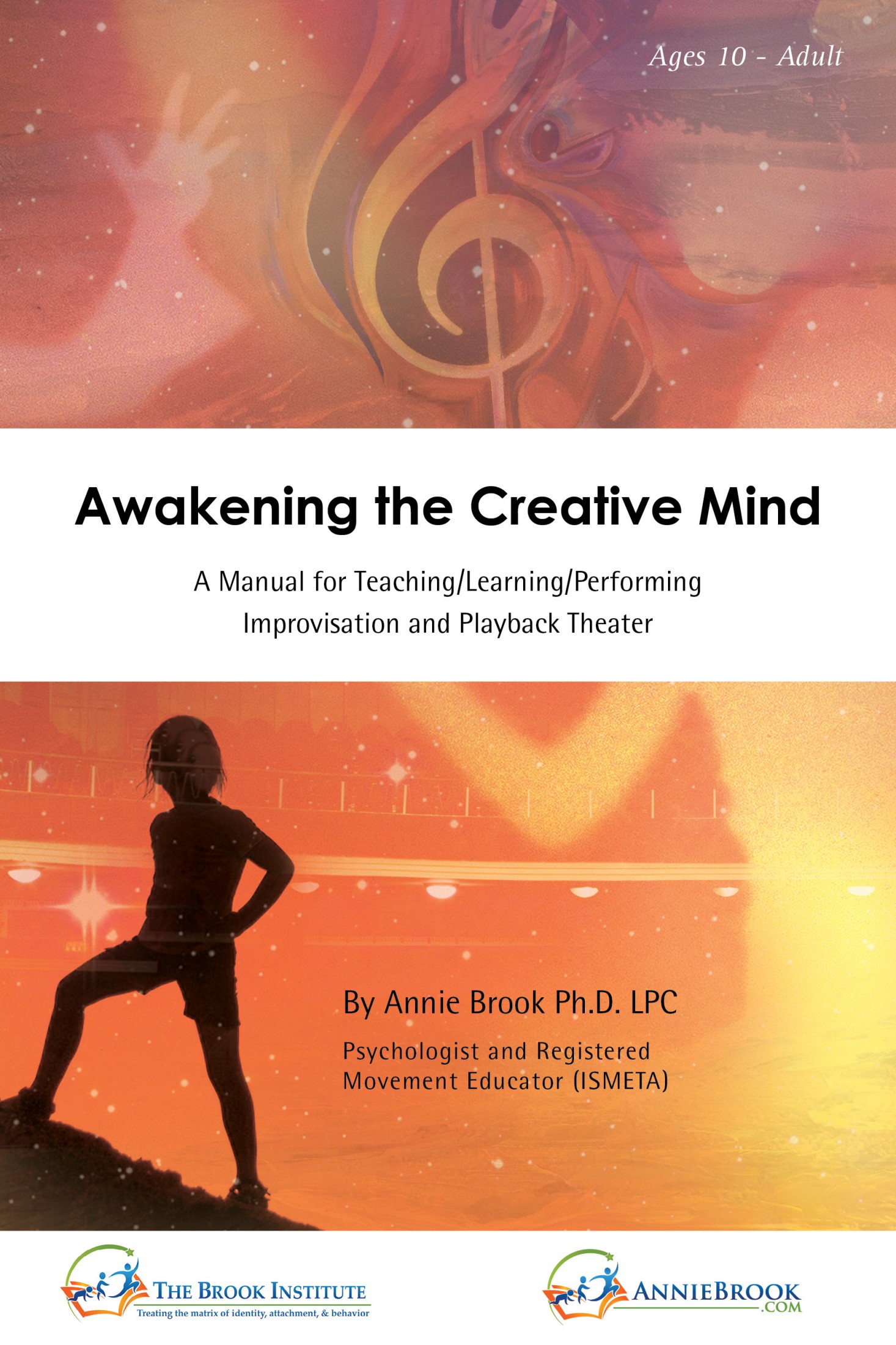Unlock Creativity, Connection, and Joy Through Play
3 Days of Play: Live with Annie Brook
Format: Live online sessions
Dates: June 4, 5, and 6 from 1-2 PM MT. (Wednesday-Friday)
Investment: $147 (includes bonus ebook)

Ebook cover of Awakening the Creative Mind: A Manual for Teaching/Learning/Performing Improvisation and Playback Theater; Annie Brook and why play matters
Why Play?
Do you often find yourself feeling overly serious or stuck in routines? Whether in personal relationships, parenting, or professional settings, embracing play can be a transformative tool to:
🎭 Enhance problem-solving abilities
🎭 Foster deeper connections with others
🎭 Navigate stress with creativity and resilience
Play can help.
In this engaging three-day workshop, somatic therapist and educator Annie Brook will guide you through the art of improvisation to unlock creativity, enhance problem-solving, and foster deeper connections in your personal and professional life.

"Learning improvisation with Annie Brook allowed me to access the very playful side of myself, as well as to witness others' expressions. Annie is a wonderful teacher and holder of groups."
— Stephanie Dueger, Ph.D., Psychotherapist and Author
What You'll Gain:
Live Guidance: Three interactive sessions with Annie Brook, a seasoned somatic therapist and educator.
Practical Tools: Techniques to integrate play into daily life, enhancing flexibility and joy.
Community Support: Access to a private group for sharing experiences and insights.
Enhanced Flexibility: Learn to adapt and respond creatively in various situations.
Improved Relationships: Use play to connect more deeply with children, partners, and clients.
Stress Reduction: Discover how improvisation can help you stay grounded and present under pressure.
Professional Development: Incorporate playful techniques into your therapeutic or coaching practice for more dynamic sessions.
Bonus Ebook: A resource packed with exercises, games, and movement practices to continue your journey.
What's Included:
Three Live Sessions: Interactive workshops with Annie Brook, focusing on practical applications of play and improvisation.
Bonus eBook: A comprehensive guide featuring writing exercises, group warm-ups, improv games, movement practices, and an introduction to leading Playback Theater.
Community Access: Join a private online group to share experiences, ask questions, and connect with fellow participants.

"There is not a day that goes by that I am not grateful for Annie and her body of work. The birth patterns that were held in the cells of my body affected all of my relationships ~ I feel blessed to now have a large toolbox of resources and the somatic re-learning of memories my body knew but my mind and heart couldn't remember ~ all of my relationships transformed and I have a language and deep understanding with which to work with them from!"
— JR
Ready to Embrace Play?
Rediscover play in your life. Discover how play can be a powerful tool for healing, connection, and growth.
Play is more than just fun—it's a vital component of emotional health and cognitive flexibility. By engaging in playful activities, you can break free from habitual patterns, enhance your capacity for empathy, and approach challenges with renewed creativity.
Frequently Asked Questions
Q: What if I can't attend all sessions live?
A: Recordings will be available for you to watch at your convenience.
Q: Do I need any prior experience?
A: No prior experience is necessary. This course welcomes everyone interested in exploring the transformative power of play.
Q: What is Improvisation in this context?
A: It's a body-mind approach to problem-solving and creativity, involving speech, writing, or movement in a way that promotes emotional health and relaxes analytical tension.
Q: What do you mean about how improv interrupts a freeze response?
A: A freeze response is a sign of nervous system overwhelm. If you also dissociate, then it is a sign you are in a shock response where too many stimuli come at once and the brain can't process; this freezes the motoring response of the body. Improvisation skills can help you release freeze and learn how to take action under pressure.
Q: How can this help me professionally?
A: Improvisation skills enable you to address present-moment dynamics in therapy or coaching sessions, leading to more authentic connections and effective interventions.
Q: What if I feel triggered during the workshop?
A: The workshop is designed to create a safe space where you can explore and release mental over-control. Supportive guidance will help you navigate any discomfort that arises. This workshop is not group therapy or intended for acute situations.
Q: Is this suitable for parents?
A: Absolutely. Playful engagement can enhance your relationship with your child, helping you to navigate challenges with creativity and empathy.
Q: How long can I access this material for study?
A: You have a full year so you can revisit the material as much as you need to. You may want to practice different parts of this course to really remember the skills shared.